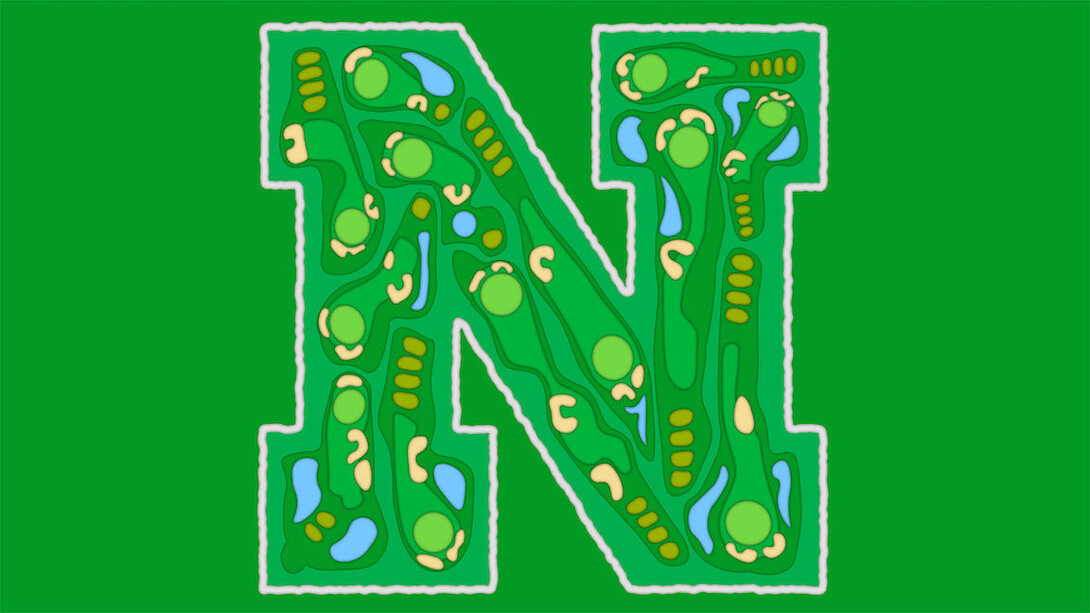
The Professional Golfers’ Association questioned Terry Riordan at the start. The University of Nebraska–Lincoln a place for a PGA Golf Management program? Really? It wasn’t in a golf-rich area. It was in the North.
“The PGA didn’t see us as a university that should have a program, for it seemed like a lot of schools were in the South,’’ Riordan says now, two decades into the university’s golf management program that the emeritus professor helped start.
The program is experiencing unprecedented growth within the university’s College of Agricultural Sciences and Natural Resources.
- It’s keeping in-state students from leaving, both for college and their careers.
- It’s drawing students from many states, some of whom are staying in Nebraska after college.
- It’s being helpful to Nebraska’s golf courses, private and public, multi-course resorts and community nine-hole layouts, in staffing them with club managers, golf professionals and greens superintendents.
While the program is separate from the university’s men’s and women’s golf teams, and development for competitive golf careers is not its end goal, the program has seen one of its alumni win professional tournaments.
Alex Beach is a 2012 graduate from suburban Minneapolis. He’s been a teaching professional at elite courses such as Baltusrol in New Jersey, Westchester in the New York City suburbs and the Breakers in Palm Beach, Florida.
Beach is a two-time winner of the PGA Professional Championship for non-PGA Tour members. He was only the second graduate of any golf management program to win the tournament. He’s also played in the PGA Championship, one of the four men’s major championships in golf, five times between 2017 and 2022.
His is an extraordinary story. More typical, but no less important, is the story of Blare Bauer, a December 2022 graduate from Holdrege, Nebraska, who works at Seminole — the playground for the likes of Michael Jordan — in Florida in the winter, and at Interlochen in the Twin Cities in the summer.
At Interlochen, Bauer is working as an assistant professional. He’ll help out with the ladies’ league. With conducting tournaments. With merchandising in the pro shop. It’s more than he envisioned when sitting in his junior-year social studies class at Holdrege High School, “not really paying attention” as he scrolled through the list of majors offered at Nebraska.
“I came across PGA Golf Management, and that was really intriguing to me,’’ Bauer said. “I read about it a little bit more and saw that Nebraska was one of the schools in the United States that also had a PGM program. And I thought that would always be a cool job because when I was growing up, I took some lessons from a club pro. I was always really interested in golf and love the game.”
Bauer toured the facilities and met Dann Husmann (’82, ’91), the program director; Brad Goetsch (’17), a PGA professional and the program’s instruction coordinator; Scott Holly (’08), a PGA professional and the program’s internship coordinator; and Joe Canny (’09), the program’s PGA professional-in-residence who is also the lead recruiter.
“It blew me away. I had plans to visit other (golf management) programs, but once I visited Nebraska, I was sold. This is where I want to be — definitely, for sure,” Bauer said.

The 2022-23 freshman class numbered a record 67 students “from all over the country and all over the world,” said Canny, a graduate himself of the program. It was the largest incoming class for any of the 18 golf management programs nationally.
Oddly, the COVID-19 pandemic has been a contributing factor to the increased interest.
“COVID — it stunk for a lot of reasons, but it made golf flush with cash,” Canny said. “Our students graduating right now are making more money than me — 15 years after I graduated. So it’s a lot more attractive of a major.”
This spring, he said, prospective students visiting campus included some who didn’t pick up a club until three years ago, or just played sparingly, then became “super passionate” during the worst of the pandemic restrictions in 2020 when their other sports were shut down. Now they want to pursue golf as a career.
Family time, too, became more important in the past several years. Often, the teenagers getting more serious about golf were playing it with their families.
“The work-life balance for students is better, the pay is better and then we have a lot more golfers,” Canny said.
Not everyone can enter Nebraska’s golf management program. Prospective students must carry a certified golf handicap of 12 or better — the equivalent of breaking 85 on a championship-length course — just to be considered for admission.
Courses provide a basic background in managing golf facilities and related organizations, business and personnel management, restaurant and hospitality management, recreation and golf instruction. Advancement requires maintaining a 2.5 grade point average. Participation in the PGA Golf Management Student Club is required. Each student must play in at least four tournaments within the program each semester.
In the first year, taking the PGA of America’s playing ability test is required. Until passing, the student may retake the test two or three times each school year.
For graduation, the university’s required 120 hours must include all golf management courses. Three full-time internships totaling 16 months — in three different types of settings — must be completed. The PGA playing ability test and all three levels of the PGA curriculum must be passed. Graduates receive a bachelor’s degree in PGA Golf Management, and with PGA-eligible employment, automatically qualify for PGA membership.
David Honnens, CEO and executive director of the Nebraska PGA, said almost 70 members of his association are Nebraska graduates of the program. The benefits are many.
“It’s a wonderful relationship with the next generation of PGA professionals. That’s No. 1,’’ Honnens said. “No. 2, it’s a great opportunity for our PGA professionals to help mentor these young men and women who do a tremendous job of helping us in the internship role.”
Riordan said the genesis of the golf management program at Nebraska, like its resurgence, was in the wake of a worldwide life-changing event.
“9/11 was kind of the impetus because it affected agriculture, affected everything, and student numbers dropped a little,’’ Riordan said. “I don’t know why I didn’t pay much attention to that. I was more in research at that time, and I was a turfgrass plant breeder. And the only thing that I had to do with golf is that I played, and it probably got me into what I was doing, but I had nothing to do with golf that was at the university.”
The new vice chancellor in the Institute of Agriculture and Natural Resources in 2001 was John Owens, who had been at New Mexico State where the Aggies had a golf management program. Owens asked Riordan to head up the new major at Nebraska. In new territory for him, Riordan began the application process with the PGA of America. One requirement was observing the three stages of what was then known as the PGA’s Business School. He did it all at once, during 11 days in Port St. Lucie, Florida.
The university had to hire three people before formal application. Riordan was one. Scott Holly, still with the program, was a graduate of the New Mexico State golf program. Tara Lee was hired away from the tournament staff of the then-Cox Classic in Omaha. It was still a tough sell for acceptance by the national PGA.
“We did everything we possibly could to make them happy so that we could get our program and I don’t really think they wanted UNL,’’ Riordan said. “They’d keep rejecting everything we’d send them. When we’d send in an application, they came back with 40 or 50 things they found wrong. They were relentless. But we kept pushing.
“The first freshman class had about 20 students. They all passed their PGA Level 1 curriculum test. That had never happened at a university before. We just had a wonderful program. The kids were good. They did well. That continued until a few years ago and numbers started dropping.”
The new freshman classes numbered about a dozen in back-to-back years during the COVID-19 pandemic. The program was in limbo for retention. So how to rejuvenate it? Riordan met with Honnens about getting it on track and they ascertained it needed a strong recruiter. Enter Canny.
“He’s turned the program around,” Riordan said.
Canny said the program is attractive to students wanting to be at a large university but might not be able to make the golf teams. They still taste competition through weekly tournaments and competition against other PGA Golf Management schools. Nebraska finished third last fall at the PGA University Championship in Las Vegas.
Essential is the support from Tiffany Heng-Moss, dean of the College of Agricultural Sciences and Natural Resources. She was one of Riordan’s advisees when she was an undergraduate in the college.
“We’re lucky here that (the college) has really gone all in on this PGA Golf Management Program and provided us the best facilities in the country, access to nine different golf courses and all the resources we need to be successful,’’ Canny said. “Tiffany Heng-Moss puts golf out front and we get the resources we need to be successful and big.”
There has been academic success as well with half of the students landing on the 2021-22 dean’s list. There has also been popular acceptance. In March, the golf management program was deemed the best major at Nebraska in campus voting for Major Madness.
Canny said another large incoming golf management class from across the country is expected this fall. More than 2,200 requests for interns are being received annually.
“Our students are landing wherever they want to go, which has been pretty dang amazing,” Canny said. “Honestly, even with the numbers we’re pulling right now, we’re not meeting demand in the golf industry. Our major reacts to demand and if the demand goes down, we’ll have to scale back a little. But everything’s been great so far. We’re just enjoying it right now.”







